The UK city where sex work is banned, but hasn't stopped
- Published
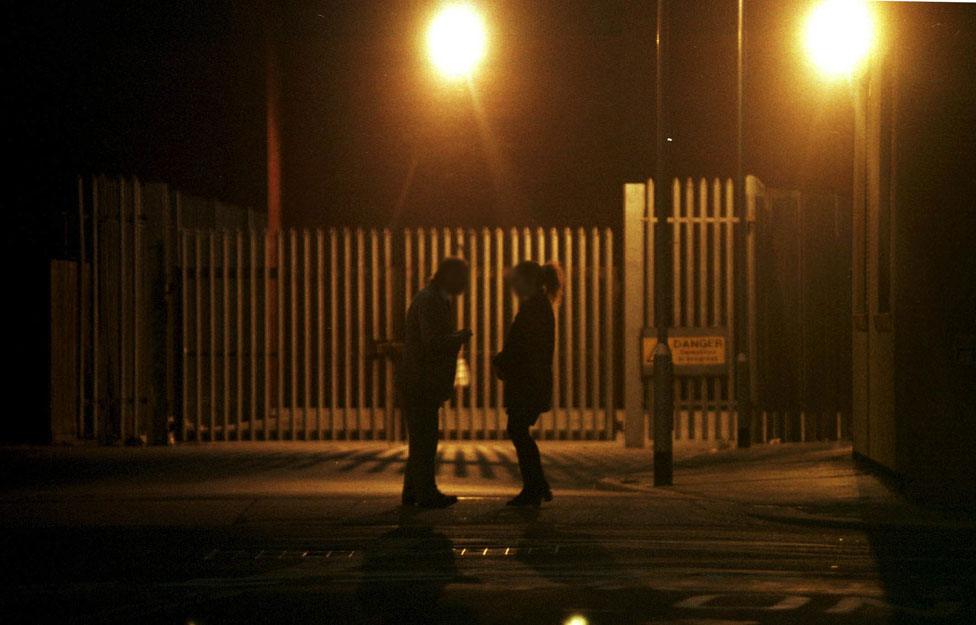
Hull is the UK's only city to have banned sex workers from its red light district, effectively making prostitution illegal. The council says the policy is working, but Millie, who once worked on the streets herself, says it increases the danger for the women involved.
Sex work "slithered" into Millie's life when she was in her twenties. "It happens quite slowly at first and then all of a sudden you're in this mad cyclone and you can't find your feet, you get lost," she says.
The cocky bravado of the women in Hull's red light district made it seem like an easy way of funding her drug addiction. But now, with more than five years on the streets behind her, she knows all that banter is just body armour against the violence and vileness that comes with the job.
"Oh, you must love sex," punters would say with a smirk. "No. I love heroin," was Millie's sharp retort. "There is no love of sex, working on the streets - it's always a last resort."
Millie's drug addiction began as a teenager, when she would steal her mum's sleeping pills and Valium. When her mum's mental illness was at its height, she would whisper menacing things through Millie's bedroom door at night: "There's evil inside you, I can see it. You are a demon, spawned from demon seed." The pills helped to block it all out. From there she graduated to ecstasy, opioids - and eventually, heroin.
"Then you get trapped in addiction because you end up needing the drugs to get through it, to block out the things you've had to do," says Millie.
She remembers how women would steel themselves for a night on Hessle Road - Hull's red light district - telling themselves that they wouldn't do anything for less than £60. But their resolve would weaken as soon as withdrawal symptoms set in. "When you're rattling you'll get in that car for less than £20 - you'd do it for a fiver, simple as that," says Millie.
When we meet, Millie has just finished reading a book about the Victorian serial killer, Jack the Ripper, and can relate to his victims. "Back then we were referred to as 'unfortunates'," she says. "We have different names now but still the same social problems: the poverty, the addiction, the violence."
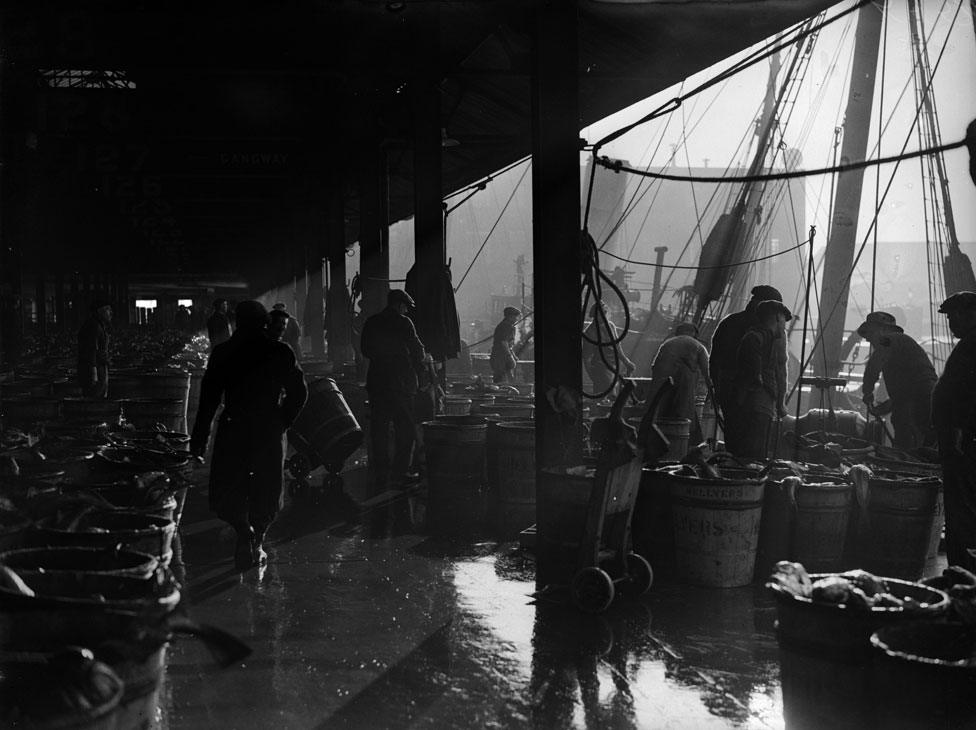
In Hull, the fishing industry and the sex trade have always been intertwined, she says, the poorest women in the fishing community at risk of sliding into prostitution. Millie knows lots of sex workers today whose fathers were trawlermen in the 1970s, when the industry went into steep decline.
"Generation after generation of women from these fishing families are working the streets - it is a terrifying prospect."
But while Hull has celebrated its fishing heritage with statues and murals as UK City of Culture this year, it takes a hard line on the sex trade. Three years ago - not long after its status as 2017's city of culture had been confirmed - it became the only local authority in the UK to effectively make prostitution illegal.
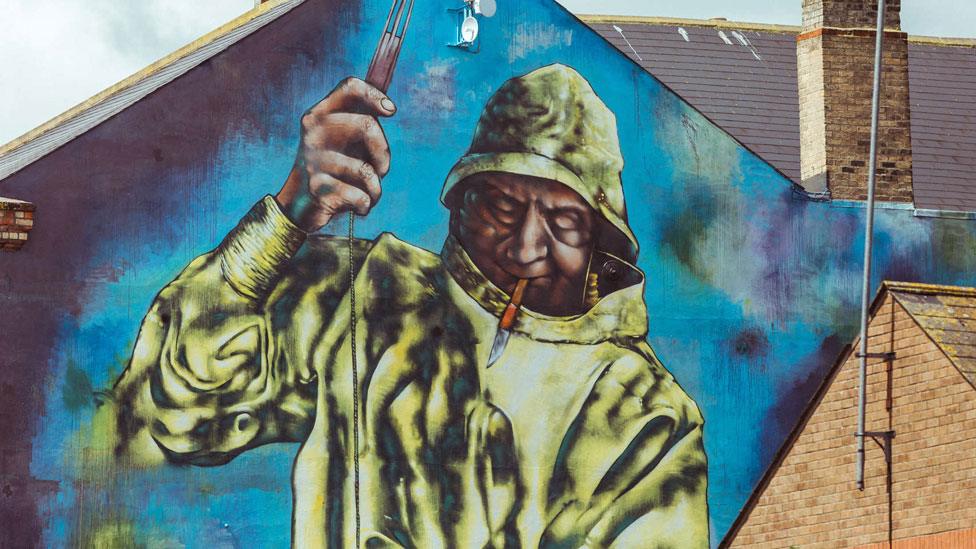
An end-of-terrace mural on Hessle Road, created for Hull's year as UK City of Culture
It did this by obtaining powers from the county court to issue injunctions under Section 222 of the Local Government Act 1972, to people found loitering, soliciting or having sex in the Hessle Road area. If they continue their anti-social behaviour they have broken the injunction, and can be arrested, prosecuted, and even jailed.
The policy currently affects more than 100 women. Last year the Lighthouse Project, a charity, had contact with 113 women working on the streets of Hull, and another 15 who had stopped - either temporarily or permanently. Women who break free may be back in a few years, charity workers say.
Millie, who has been out of the sex trade and clean from drugs for about 10 years, says Section 222 has forced the sex workers out of sight, making their lives more dangerous. To dodge police, they work increasingly in back streets or on isolated industrial estates - areas that are poorly lit and away from surveillance cameras.
"Even without Section 222 to contend with, it's lonely, it's frightening, it's degrading - and it's a secretive life," Millie says.
"I can understand that Hull City Council wants to clean up the streets, but I think the best way to do that is not an Asbo, or to victimise victims, I think it is to provide support and proper treatment and look at the social issues - the homelessness, the domestic violence, the exploitation, the drug addiction, the mental health problems."
Millie is one of 11 women who worked with the Lighthouse Project to produce An Untold Story, a book documenting the reality of being a sex worker in Hull. In the three-and-a-half years it took to prepare, five women working on the streets were murdered. Another 11, including two of the book's contributors, died from other causes - pneumonia, drug overdoses or other conditions resulting from years of sex work, and drug or alcohol abuse.

Millie in An Untold Story...
Sorry. It's only one word containing five letters. It's not enough, it will never be enough.
I miss being a mum. It's down to me that I'm not any more. I hold my hands up to all the mistakes and bad decisions I've made, but it's not enough. It will never be enough.
It's not just birthdays, but the silly little things, like making up daft songs about what we were having for tea and singing them all the way home from the shops. Or writing teeny tiny letters from the tooth fairy in minuscule writing, thanking them for an incredible tooth and to keep up the good work. That their tooth would be used to help build the fairy kingdom.
I miss being a Mum. My memories of my three children are tainted by guilt, filled with shame, saddened by regret.

Since the policy came into force, 29 women have been arrested and served with court orders and four have been prosecuted. Two women have been sentenced to jail; one to 14 days, the other to one month, though her sentence was suspended for a year. Five women are currently waiting for a court date. "Sending them to prison for two weeks won't do anything and it isn't even enough time to provide rehabilitation," argues Millie, who served short sentences in prison herself, and would go back on the streets the day she was released.
A couple of times a month, Millie goes out at night on a Lighthouse Project bus. Women who board it are given condoms, hot drinks and information on dangerous individuals - passed on by Ugly Mugs, a charity that collects reports of incidents from sex workers and fields them out to warn others.
"They come to unburden their day - they're telling me their problems and they're the same ones I faced," says Millie. She commiserates with them on painful anniversaries - the day their children were taken away by social services, or the last time they spoke to their parents.
But since Section 222 came into force, women have been more afraid to use outreach services, says Emma Crick, who led the Untold Stories Project.
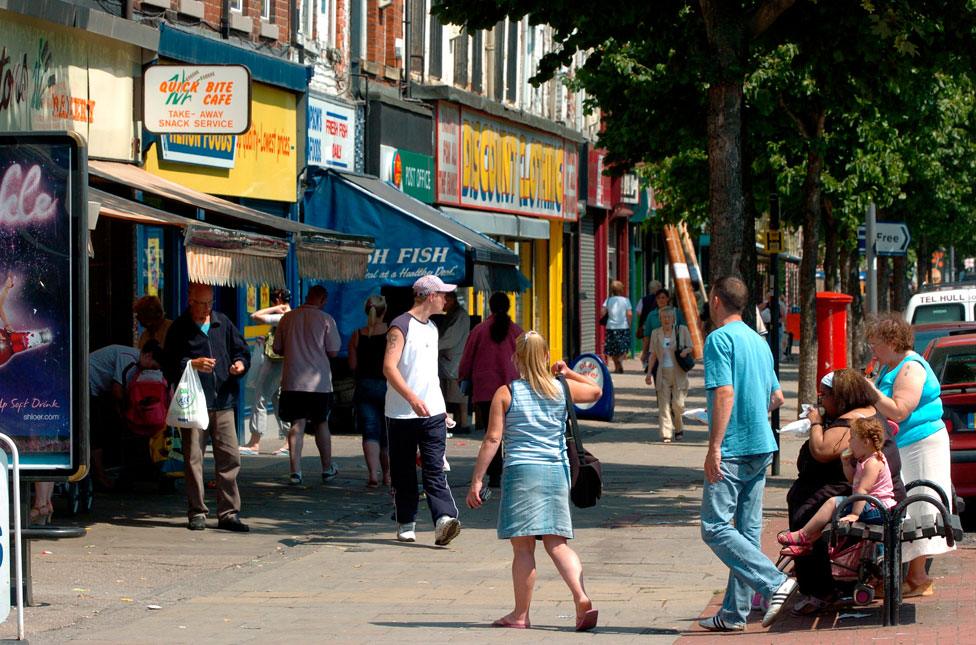
During the day, Hessle Road is a busy shopping street
"Many times when I have been working in evening outreach, police are around and appear to be waiting for the women to get on or off the vehicle so they can target them," she says.
As a result of the strong police presence, Hull's sex workers have also become more dispersed, making it harder to offer them support services, Crick says.
The director of Ugly Mugs, Georgina Perry, says the charity has received just two incident reports for Hull in 2016/17 - well below average for a city of its size. In Nottingham, a similarly-sized city, 35 incidents were reported during the same period, she says.
"What we see in every authority where there is a heavy-handed enforcement approach is that the number of reports [to Ugly Mugs] goes down and the number of women then willing to take it to the police goes down too, because they are frightened about criminalisation," she says.
Perry brands Hull council's approach to sex workers a "quick and dirty way of superficially dealing with a problem that is about poverty and deprivation".

Millie in An Untold Story...
You're usually "sorting somebody out" [buying their drugs]. I was sorting out my boyfriend, and a couple of his mates. There's always spongers who just soak up everything that they can get hold of, drug-wise.
A lot of fellas, they say, "I'm looking after our lass," and, "I'm looking after my girl." No they're not! They don't want to miss out, so they need to be there when the punter drops her off. If not, they might not get anything.

By contrast, Graham Paddock, anti-social behaviour team leader at Hull City Council, says the ban has "been a success so far" and was renewed in December 2016 for another three years.
"We had reports of sexual intercourse in gardens and against fences, so we had to do something to protect the community," he says.
"We are never going to stamp out prostitution in Hull entirely, but at the end of the day we have to send a message out that that kind of behaviour will not be tolerated."
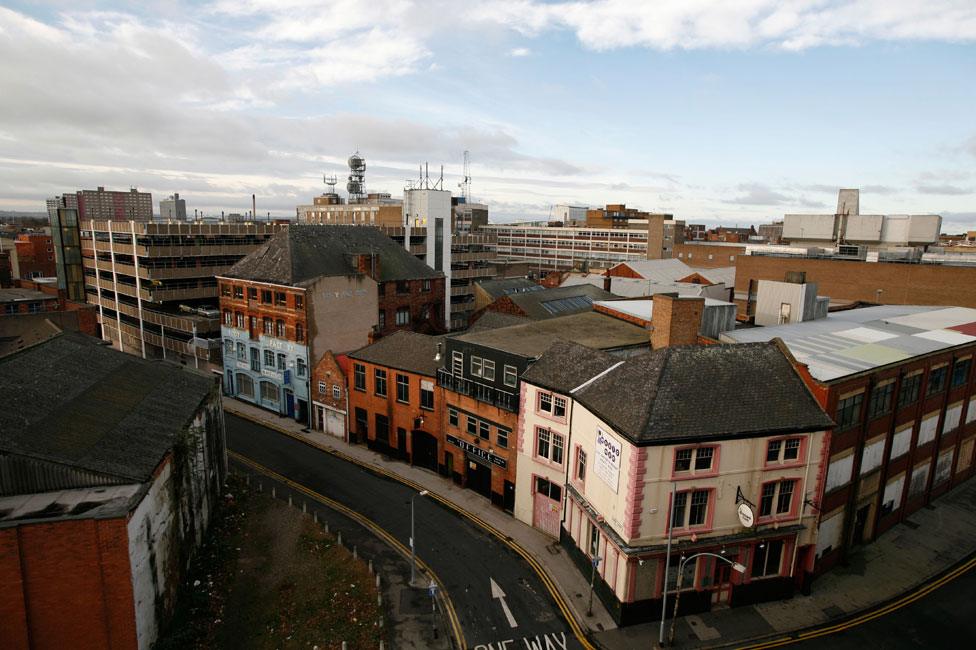
Doing sex work is known in Hull as "going down the lane", after the former red light district, Waterhouse Lane
Residents reported an improvement after the policy based on Section 222 was introduced, he says.
But is this a case of "victimising victims", as Millie puts it?
"I can see that argument, but I guess our number one responsibility is the local community being affected," Paddock replies.
He adds that police tactics have changed over time, so that it isn't just the women who are targeted.
"When it first came into place in 2014 we were concentrating a lot on the girls themselves, but it was always intended for anyone - whether it be pimps, partners, boyfriends - so I've noticed there's been a change recently where more punters are actually being served with the orders now."
No men have yet been prosecuted, however.
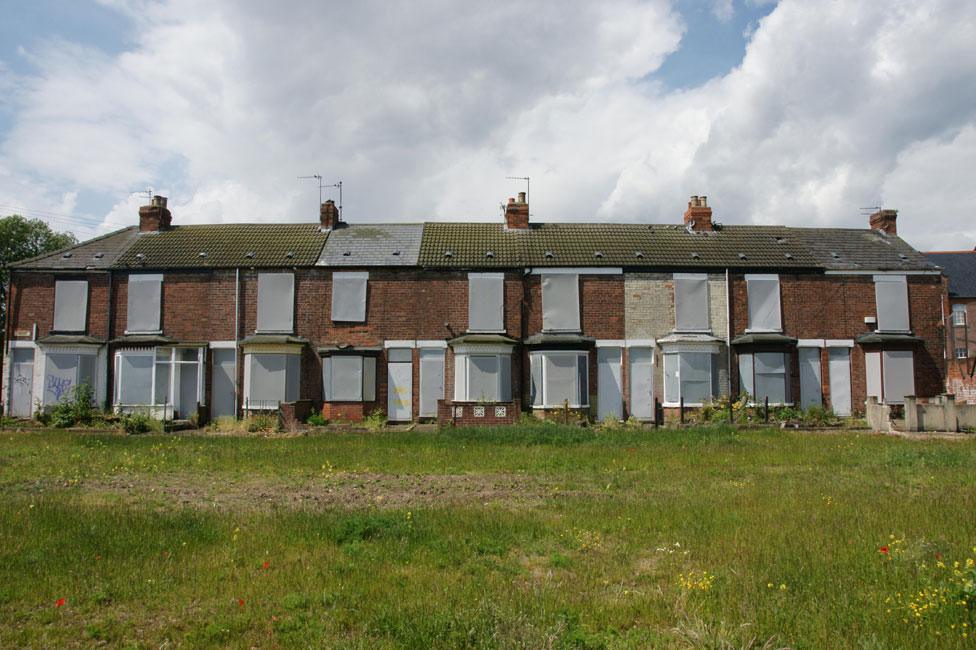
Slum housing on the edge of the red light district has been demolished in recent years, to make way for modern homes
A multi-agency group made up of representatives from the police, the council and charities - including the Lighthouse Project - is now meeting to discuss the best way of using Section 222, while also supporting the women involved in sex work. But Millie is frustrated that no-one with experience of sex work has been invited to take part. She thinks she could have made a useful contribution.
She would have argued that if the goal is to protect the local community, then the women and most of their clients are also members of the local community. And she would have underlined that they can be helped to find a way out of prostitution.
"The saying 'once a junkie always a junkie' isn't true - you can break free from addiction," she says. It wasn't easy - she relapsed many times - but after moving into a hostel and getting the right counselling, she started to claw back control of her life.
She remembers the first time she decided not to use her money to buy heroin - she bought a necklace instead. It was a silver cross with her mum's birthstone in it - amethyst.
"I remember the pride I felt - I wasn't used to feeling pride, it was an emotion I'd lost long ago."

Millie in An Untold Story...
Kate's been my ever-patient mentor for all the years I've volunteered for Lighthouse...
We continue our walk up the main road of the red light district in Hull, towards the next working girl, stood on the next street corner. The Lighthouse car pulls up in front of us again, playing a crazy game of leap frog with us, keeping Kate and I within sight.
Another working girl opens the side door as we arrive at the car. She's in a hurry so she just needs a hot drink and a goody bag, then she's on her way.
For the next two hours we stop and talk to every working girl we see. Most we know. Some are new.
When the night shift is over and I'm snuggled up under the duvet with my dog curled up behind my knees, my husband breathing rhythmically sleeping beside me, a man who's never once thrown my past in my face, I once again realise how fortunate I am.
Millie's name has been changed
See also: My work as a prostitute led me to oppose decriminalisation
Join the conversation - find us on Facebook, external, Instagram, external, Snapchat , externaland Twitter, external.
